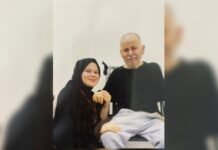Şebnem Korur Fincancı, a prominent human rights activist, doctor of forensic medicine and head of the Turkish Medical Association (TTB), has said Turkey’s Council of Forensic Medicine’s (ATK) status as the sole authority to determine whether sick inmates are fit to remain in prison poses a “serious problem,” Turkish Minute reported, citing the Mezopotamya news agency.
Doubts over the independence and credibility of the ATK, an institution that assesses the condition of sick inmates to decide if they are fit to remain in prison and is under the jurisdiction of the Ministry of Justice, have grown in recent years as more and more critically ill prisoners have died behind bars.
The institution has often received criticism from human rights activists and opposition lawmakers for not releasing critically ill prisoners so they can seek proper medical treatment and instead leaving them behind bars until they reach the point of no return.
Fincancı on Tuesday told Mezopotamya that the ATK should not be the only source for the evaluation of prisoners’ health given the large number of independent scientific institutions, including universities, in the country.
“Unfortunately, the ATK is affiliated with the Ministry of Justice. That’s why we know it’s in a position that undermines the principles of impartiality and independence. … We need an independent body [to determine the situation of sick inmates],” Fincancı argued.
The issue of sick prisoners is Turkey’s “bleeding wound,” Fincancı said, underlining that inmates, too, have the right to access health care.
“For years representatives from human rights organizations and unions haven’t been allowed in prisons. Thus, we’re having problems [monitoring and] assessing the inmates’ health problems. This is the situation that we’re in right now,” Fincancı said.
“Successive deaths in prisons indicate that there are problems in inmates’ access to health care. Independent institutions need to be established. Independent commissions must be allowed to supervise [the condition of prisoners],” she added.
In one of the latest cases, the ATK last week issued a report for the third time saying Yusuf Özmen, an inmate suffering from metastasized testicular cancer for the last four years and almost totally disabled, is healthy enough to remain in prison.
A previous medical report signed by 40 doctors said Özmen was not fit to stay in prison. However, the ATK issued another health report in April 2021 saying he could remain incarcerated.
According to the Human Rights Association (İHD), as of June 2020 there were more than 1,605 sick inmates in Turkish prisons, approximately 600 of whom were critically ill. Although most of the seriously ill patients had forensic and medical reports deeming them unfit to remain in prison, they were not released. Authorities refuse to free them on the grounds that they pose a potential danger to society.















